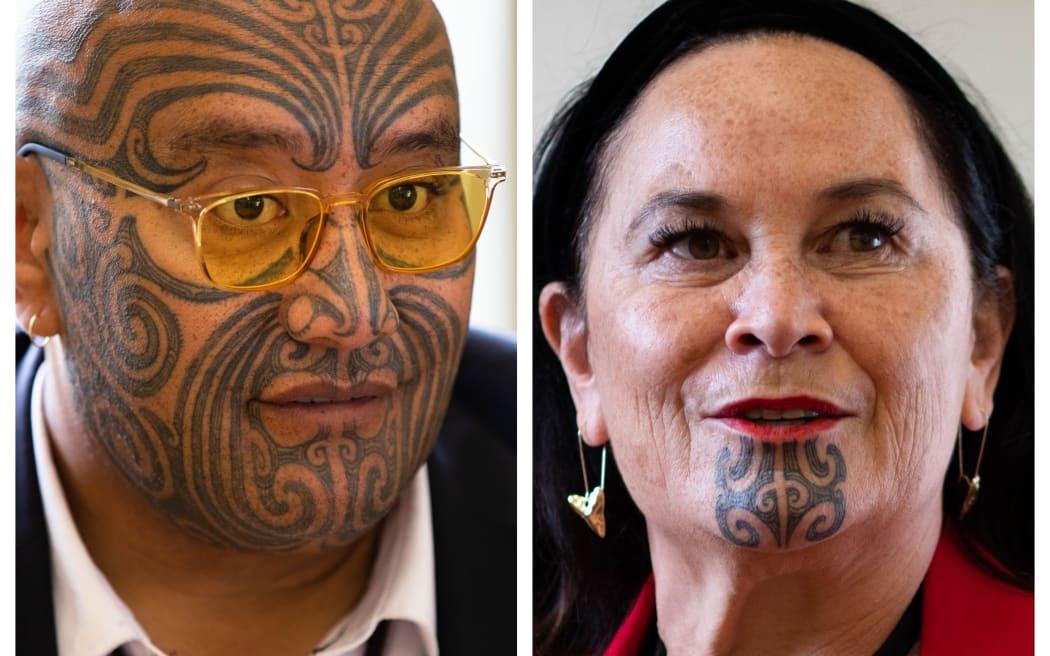
Te Pāti Māori co-leaders Rawiri Waititi and Debbie Ngarewa-Packer. Photo: RNZ / Angus Dreaver
Te Pāti Māori can't see itself being part of a Labour or National-led government after next year's general election.
Some polls this year have shown the party could hold the balance of power.
But in an end-of-year interview with RNZ, co-leaders Debbie Ngarewa-Packer and Rawiri Waititi said while they were open to conversations with both parties, they were reluctant to go into government with parties which they say are not honouring the Treaty of Waitangi.
"Do we see anyone in here that ... would be committed to advancing Māori ... addressing the redistribution of wealth ... addressing the fact that it's our people who are in pain? The answer, currently, based on manifestos, and the way that they are campaigning and communicating is no," Ngarewa-Packer said.
Things could be different if Māori had been treated differently by both parties, she said.
"We must stay true to what is going to be the best pivotal position to advance us out of the adversity and disparities we're in. At the moment, what we don't see from any of them is a real true, intentional approach towards progressing to a Te Tiriti-centric Aotearoa."
Waititi used an analogy to describe what he saw as his party's role in Parliament.
"On the front of the wharenui you have two bargeboards, you can see that as Labour and National. Te Pāti Māori are the koruru that sits smack bang in the centre, holding both of those bargeboards to account.
"That's where we see our position in this house. It's not taking preference over left or right, because we're not left or right. We are Māori, and we're straight up the guts."
The race for the Māori electorate seats
The party is hoping to grow its caucus in 2023 and will contest all seven Māori electorate seats.
Heather Te Au-Skipworth is the only candidate to be named so far, but others are lined up to represent the party.
"All in good time, that will be revealed," Watiti said.
The party planned to focus resources on campaigns in the electorates it sees as vulnerable; Waiariki, Te Tai Hauāuru, Tāmaki Makaurau, Ikaroa-Rāwhiti and Te Tai Tokerau.
Four of those seats are currently held by Labour MPs.
Te Pāti Māori's message to voters in those electorates: the party brings an authentic, unapologetic Māori voice to Parliament.
"All we have to do is be judged on our performance, and continue to show that we may be two, but we're the loudest two and we're the only two who will hold the government and opposition to account on a Te Tiriti-centric Aotearoa," Ngarewa-Packer said.
Waititi went further, saying Te Pāti Māori brought a "liberated Māori voice" and was not "hamstrung by Pakeha policies".
When asked if he was referring to Labour's Māori caucus, Waititi said "oh, absolutely".
Highlights of 2022
Reflecting on the year, Ngarewa-Packer said she was proud to "shake as many trees as we did".
"Every year you come out and you think 'have we been true to the kaupapa were put here to do?'
"When I look at environment, I look at people, I look at hauora... I can leave here, hand on heart, and say 'yeah, we did it and we'll continue to do it'."
Waititi's highlights included 70,000 people signing the party's petition to change New Zealand's official name to Aotearoa and getting two bills drawn out of the member's ballot.
Working with Ngarewa-Packer had been another highlight, he said.


